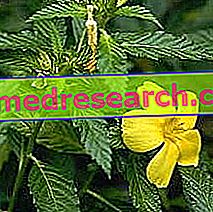
Scientific name
Turnera aphrodisiaca, sin. Widespread TurneraFamily
TurneraceaeOrigin
Central and South AmericaSynonyms
Turnera
Used Parts
Drug consisting of leavesChemical constituents
- Essential oil (1, 8-cineol and monoterpenes);
- Cyanogenic and hydroquinonic glycosides (arbutin);
- Resins;
- Fatty acids;
- Tannins;
- Polysaccharides;
- Bitter principles (damianina).
Damiana in Herbalist: Property of Damiana
Damiana is a plant traditionally indicated as an aphrodisiac, tonic and neuromuscular stimulant, and is frequently used together with other plant drugs (Yohimbine, Muira puama, Maca Andina, Ginkgo biloba) in case of impotence. Despite popular traditions, adequate clinical studies are still lacking.
The main therapeutic indications see the damiana protagonist in the treatment of depression, lethargy, psychogenic dependence, nervous dyspepsia and atonic constipation.
Biological activity
Damiana is attributed different properties, among which we remember those hypoglycemic, antiulcerogenic, anti-inflammatory and aphrodisiac.
Some of these activities have been confirmed by studies conducted in vitro and on animals; however, there are no clinical studies on humans that confirm its real therapeutic efficacy and effective safety (in fact, even if in very low concentrations, damiana contains cyanogenic glycosides).
Studies conducted in vivo have shown that damiana is able to exert a hypoglycemic effect both in animals suffering from hyperglycemia and in healthy animals.
Similarly, the anti-inflammatory activity attributed to the plant was confirmed.
Furthermore, a study conducted on rats has shown that damiana is also able to reduce gastric lesions caused by indomethacin (an NSAID) and alcohol, as well as being able to exert an antiulcerogenic action.
From other research conducted in vivo, however, it emerged that damiana is able to exert beneficial effects in the event of impotence, but only on sick animals and not on healthy animals. Therefore, the plant could be useful in the treatment of some types of sexual dysfunctions, but it cannot be considered an aphrodisiac remedy.
Finally, in a recent study (2015) conducted in vitro, the damiana extracts have been shown to possess an interesting, and potentially useful, cytotoxic activity against malignant breast cancer cells.
Therefore, although this is a preliminary study, this plant could prove to be a potential ally to be used in anticancer therapies. However, before being able to approve similar medical applications of damiana, it is necessary to carry out further and numerous researches on the matter.
Damiana in folk medicine and homeopathy
In folk medicine, damiana is used as an aphrodisiac remedy, in the treatment and prevention of different types of sexual disorders, such as impotence and decreased libido, but not only. In fact, the plant is used in traditional medicine also for the treatment of bladder inflammation, nephritis, diabetes and nervous breakdowns.
Damiana is also used in homeopathic settings, where it can be found in the form of granules, drops and mother tincture.
Generally, homeopathic medicine uses this plant in case of male impotence, erectile dysfunction, premature ejaculation and decreased libido; in addition to using it as a remedy to combat dysmenorrhoea.
The dose of homeopathic remedy that must be taken can vary from individual to individual, also depending on the type of disorder that must be treated and according to the type of preparation and homeopathic dilution that you want to use.
Side effects
Nausea, insomnia and headache may appear.
Pharmacological Interactions
- Hypoglycemic agents: possible strengthening of the effects of the drug.



